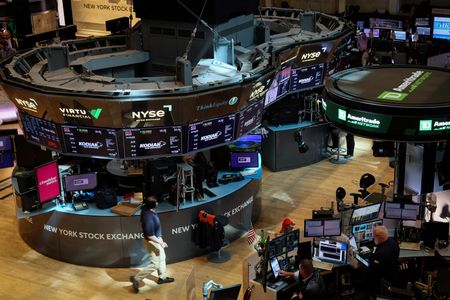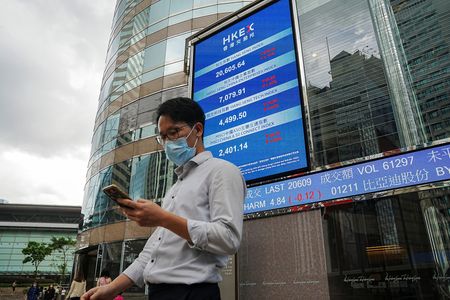By Herbert Lash
NEW YORK (Reuters) – The dollar rebounded off a 15-month low and global stock markets rose on Tuesday as upbeat earnings on Wall Street and retail sales pointing to a resilient U.S. economy sealed expectations that the Federal Reserve will hike interest rates next week.
Bank of America posted a 20% surge in second-quarter profit and Morgan Stanley beat analysts’ estimates, suggesting companies will deliver results that surpass the market’s lowered expectations for this earnings season.
Retail sales increased 0.2% last month, the U.S. Commerce Department said, but core retail sales increased 0.6%, excluding automobiles, gasoline, building materials and food services. Headline data for May also was revised higher to show sales gaining 0.5% instead of 0.3% as previously reported.
The dollar slid to a 15-month low before rebounding as futures pointed to a 97.3% probability that the Fed will hike rates by 25 basis points at the conclusion of a two-day meeting on July 26, according to CME Group’s FedWatch Tool.
The dollar index rose 0.044%, while the euro slid 0.05% to $1.1228.
Analysts have been taking down estimates, setting a very low bar to clear, while last week’s inflation data gave the market new-found confidence that the Fed is very close to wrapping up its tightening campaign, said Jimmy Chang, chief investment officer at the Rockefeller Global Family Office in New York.
“Historically when you get to that stage when the Fed finishes rate hiking and the economy is still doing OK, the market tends to rally,” Chang said. “That combination creates this Goldilocks scenario and I feel that we’re going through that phase.”
MSCI’s gauge of stocks across the globe gained 0.51%, while in Europe, the pan-regional STOXX 600 index rose 0.62%.
On Wall Street, the Dow Jones Industrial Average rose 1.06%, the S&P 500 gained 0.71% and the Nasdaq Composite added 0.76%, rebounding from early losses.
Asian stocks fell earlier in the session as markets caught up with growth data from Monday showing the post-pandemic bounce in China’s economy was over.
Deutsche Bank said it was lowering its forecast for China’s economic growth this year, following similar moves on Monday by J.P. Morgan, Morgan Stanley and Citigroup.
“China is super important to Europe,” said Fiona Cincotta, senior markets analyst at City Index. “There are a lot of concerns about what weakness in China could mean for Germany and the German economy, and I think we’re seeing that being played on in the DAX, which is struggling to push higher.”
Besides the Fed, the European Central Bank and the Bank of Japan also hold policy meetings next week.
Expectations that the Fed and the ECB will diverge on rate hikes have caused the dollar to weaken recently.
Euro zone government bond yields were down, with the German 10-year yield hitting its lowest since June 29 at 2.337%, down around 1.1 basis points on the day.
The yield on U.S. 10-year notes slipped 0.2 bps at 3.7951%.
Oil prices climbed more than 1% after China said it will act to support economic growth in the world’s biggest oil importer and on expectations the Fed will stop raising interest rates soon.
Brent futures rose $1.13 to settle at $79.63 a barrel, while U.S. West Texas Intermediate (WTI) crude settled up $1.60 at $75.75.
Gold rose to a more than one-month high, bolstered by a softer dollar and lower Treasury yields, with investors betting that recent U.S. economic data make the case for a pause in the Fed’s interest rate hikes after next week.
U.S. gold futures settled 1.2% higher at $1,980.80 an ounce.
(Reporting by Herbert Lash, additional reporting by Elizabeth Howcroft in London, Selina Li in Hong Kong; Editing by Chizu Nomiyama, Jonathan Oatis and Deepa Babington)


